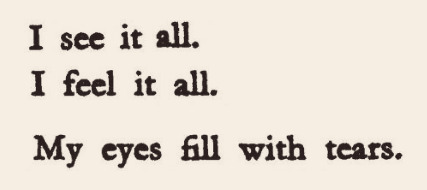Music transcends categories. Composer and writer Christian Carey's explorations of music, art, poetry, etc.
Don't wanna be here? Send us removal request.
Audio
(christiancarey)
A setting of Jane Kenyon’s poem “Otherwise.”
0 notes
Audio
Listen/purchase: Sextet by Christian Carey
1 note
·
View note
Audio
(christiancarey)
0 notes
Audio
Listen/purchase: Wiley Overture by Christian Carey
0 notes
Text

Virginia Woolf, from her novel titled "The Waves," originally published in 1931
5K notes
·
View notes
Text
https://www.stereogum.com/2311429/brian-wilson-beach-boys-playlist-deep-cuts/lists/
0 notes
Text
Hectorine — Arrow of Love (Take a Turn)

Photo by Emily Dulla
“These Hills,” the third song on Arrow Of Love, is a lament and a hymn. Sarah Gagnon’s articulate vocal has a mourning glow, lending a tight, timeless theatricality to lyrics like “as I wander ‘neath the redwood trees, the birds still sing your song.” Her mellotron flute and co-producer Geoff Saba’s lucid 12-string guitar picking provide a shimmering plain to explore. The song, like the album, is ornate without being baroque and whimsical without affectation. This is precise and dramatic, yet conjured and dreamy music, delivered with devotion.
The katabasis of Inanna, a Mesopotamian goddess of love and war is the album’s conceptual, though not textually explicit, structure. Fittingly, Arrow of Love begins deep in purgatorial heartbreak with “Is Love an Illusion.” It isn’t styled as a question, but contains several: “is it my fault I loved you with closed eyes?...were you laughing at my tears as I laid down and cried?” The track is appropriately probing, with sleek rays of synthesizer, a riffling, plinking marimba and eddying guitar. “Heart Of Stone” digs up more questions, this time for the narrator (“I don’t wanna keep on walking down this road alone/but what else can I do?”), and unsatisfactory medical opinions (“they told me that if I just wait a while my heart would calcify.”) The song is another that pulses with marimba and has one of the record’s quicker tempos on muted, efficient drumming, forceful bass and spurring horns. A fresh, starry guitar solo from Max Shanley provides lift, even as the narrator wrestles down the weight of her possibly petrified vascular system. It’s a showcase for Gagnon’s vocal dexterity — note the way she glides on “goes down” and “stone” and warbles the end of “what else can I do?”
Heavy bass tones and a sighing organ infuse Gagnon’s warm but melancholy performance on “No Hallelujah.” The relation to Leonard Cohen is less in the title and more in her resonant pronunciation, the way she draws great strands of melody from nearly spoken lines like “I had to prove my holiness/as no man ever had.” The storytelling, the pacing of the doomed hero’s journey — embodied Joan of Arc, in this case — is reminiscent of Jana Horn’s “Jordan.” In both songs, the steady, repeating instrumentation gives the narrative an inescapable forward motion.
“No Hallelujah” is one of two songs that hint at the inciting deity’s violent side, where armor is donned and swords are hoisted in the name of love (or against it). The other is the title track, where Jon Wujcik’s drum kit kicks and clicks with the sense of a slow-developing dancefloor, or, if you like, trots like the horse on which the narrator is saddled, “steel from head to toe.” When the unexpected projectile slams through “the…iron rings around [her] heart” it’s not a source of joy but confusion: “pierced by the arrow of love/and now I don’t know what to do…I don’t know if your heart will be true.” Wasn’t that supposed to be impenetrable? Still, it’s something new, perhaps a light back to the surface. And as Saba’s saxophone winds through a brief blister of lead guitar, there’s a measure of hope in the rolling bassline and the tone of Gagnon’s voice.
The splashy 12-string strokes and empathic drum fills of “Take a Chance with Me” suggest that hope, expressed, might be rewarded. Early on, the electric piano line shadows the melody of “I’ll Be Your Mirror” and “Take a Chance with Me” is also a proposal: a little optimistic, necessarily a little grandiose and desperate too. Here, Gagnon sounds uninhibited, going full-force towards a future she sees in “eyes…like the sea after a storm.” If ��Take a Chance with Me” sounds like a triumphant reemergence from the underworld, then “Slip Through My Fingers” sounds like the cautious and always dangerous looking back. It’s a stately conclusion thanks to Saba’s silver harpsichord and Wujcik’s deliberate, unshowy beat, with lyrics grounded in determined acceptance. “Which way the tide will turn, we’ll never know” is a far cry from the “for the record” annunciation of lovelessness on “Everybody Says.” But armed this time with the knowledge of what she can and cannot control, contra “Everybody Says,” it seems our hero may love again, after all.
Alex Johnson
5 notes
·
View notes
Text
My review of Catherine Lamb's piece Interius/Exterius, recorded by Ghost Ensemble for Greyfade Records.
Catherine Lamb x Ghost Ensemble — Interius/Exterius (Greyfade)

Composer Catherine Lamb (b. 1983) deals with harmonic spectra and microtones in her work. Slow, staggered presentations of overtones unfold into rich vertical sonorities, with the tiniest shift in intonation serving more as an event than an inflection. Ghost Ensemble (Margaret Lancaster, flute; Sky Macklay, oboe; Ben Richter, accordion; Lucia Stavros, harp; Chris Nappi, hammered dulcimer; Martine Thomas, viola; Tyler J Borden, cello; James Ilgenfritz and Gregory Chudzik, contrabass) is a go-to for adventurous music-making, and they take to Lamb’s with commitment and precision.
Interius/Exterius (2022) is a large-scale piece in which Lamb deals with the spatiality of sounds. As the title suggests, the juxtaposition of internal and external sounds is a primary guiding principle. Here these are defined as sounds working their way to the center of the ensemble grouping and outward to its periphery. Amid sustained winds and strings, the percussive attacks of harp and dulcimer provide signposts for ascertaining this deployment.
Lamb has cited Deep Listening (1986), awork by Pauline Oliveros (1932-2016) recorded in an empty cistern, as an influence. Deep Listening also refers to Oliveros’s practice that became an academic subdiscipline, complete with a program at Rensselaer Polytechnic Institute.
Interius/Exterius was recorded at Bunker Studio in Brooklyn, not in a cistern, but its production by Matt Sargent and Joseph Branciforte affords the piece a spacious character. This abets the listener’s ascertainment of the movement throughout the ensemble of sonic material. Interius/Exterius would be a great piece to mix for surround sound. As is so often the case, a live hearing would be revelatory.
Lamb has spoken about her recent struggles with interiority and exteriority as a composer and as a person. While one hopes she can reconcile these elements, the ambiguity imparted by Interius/Exterius serves as a fascinating metaphor for the gradual growth that can be found in such lived experiences.
Christian Carey
4 notes
·
View notes
Text
Hallelujah the Hills — Deck (Best Brothers)

Long ago, the music industry decreed that no band should make more than one album every two years, and no album should exceed ten to 12 tracks, unless said tracks were very short, in which case, up to 14 were acceptable. That is, if you’re playing along at home, one new song every two months, tops, with penalties for overachievement. But then the music industry died, and here we are. Ryan Walsh, for the last couple of decades the chief creative force behind Hallelujah the Hills, presents a four-part concept album with 54 songs, featuring his core band plus an assortment of New England musical legends. It’s too much to absorb to in one sitting or one day or maybe even one week, given the knotty lyrics and well-constructed melodies, but Walsh is okay with that. Take your time. Pick your favorites. “Warning: There is no correct way to listen to Deck,” Walsh writes in the album’s liner notes. “We created it in a way that encourages play with its elastic, modular nature. This is a story. These are the songs. This is the deck.”
The album is organized into four loosely thematic parts corresponding to the suits of a card deck. Clubs collects the rowdy, rock-show bangers. Hearts showcases Walsh’s quieter, more stripped down, ballad-y side. Diamonds has the richest, fullest, orchestral arrangements. And Spades is a hold-all for the weird stuff that didn’t fit anywhere else. You could listen to any of the four parts as a stand-alone album, but you’re not required to. Walsh even recommends picking 13 cards out of a deck and lining them up with the requisite songs, as a way of making a mix and, incidentally, a form of divination.
As I write this I’m listening to all four albums on shuffle, and the first thing that jumps out is how good Walsh is making songs. Here’s rollicking “Jokes on You,” the two of Diamonds, with its punch of drums, its draping strings, its melancholy trumpet, its ode to creative prolixity. “This wheel’s on fire/Now you’re sayin’ that you’re tired/When everybody taps out/I’m just coming alive,” and yes, grab a power bar. You’re going to need some fuel if you want to keep up.
Now comes a quieter moment, song made of piano chords and emotional complexity, the Jack of Hearts entry called “Something Great.” ”You were trying to do something great/and I may never forgive you,” murmurs Walsh in his rueful, worn-in tenor, sketching the grey areas of ambition and connection and compromise.
The songs are performed by Hallelujah the Hills’ core members, Walsh himself on guitar and lead vocals, drummer Ryan Connelly, violist (he also does the singing saw on lovely, heartsore “Classic of the Genre”) David Michael Curry, Joseph Marrett on bass, Brian Rutledge on trumpet and synth and Nicolas Giadone Ward on various keyboards and guitar. It’s a very good band, solid but imaginative and well used to filling out the textures of Walsh’s melodies. There are guests, too, demonstrating HTH’s longstanding central place in Boston indie culture and Walsh’s large circle of admirers. That’s Sadie Dupuis belting slack rocking “Uncanny Valley” to kick off the Clubs disc, and Craig Finn one song later bolstering the chorus of “Burn this Atlas Down.” Ezra Furman takes lead vocals on the ebullient, resilient “Rebuilding Year,” and again on “This is a Song.” Does the raspy whisper on “I Did My Own Stunts,” sound familiar? Maybe that’s because it’s Mission of Burma’s Clint Conley.
All of which supports the argument that Deck is just too big and various to cover in a normal sized review, but it’s very much worth tackling in bits. If you’ve ever enjoyed Walsh’s clever, hyper-verbal mayhem, you’ll enjoy this. Just make sure you have snacks handy and are wearing comfortable clothes. You’re going to be here for a while.
Jennifer Kelly
3 notes
·
View notes
Video
youtube
Morton Feldman, Rothko Chapel - Les Cris de Paris - Ensemble intercontem...
1 note
·
View note
Text
"There's nothing elegant in being a drunk It's nothing righteous being 60 and punk But when you're looking in the mirror do you see That kid that she used to be? Broke and working in a record store Daydreaming about the upcoming tour Were you happier when you were poor? Were you happier when you were poor?" - Ben Gibbard.
2 notes
·
View notes
Video
youtube
AIR - Cherry Blossom Girl feat. Charli XCX (Live at We Love Green 2025 -...
3 notes
·
View notes